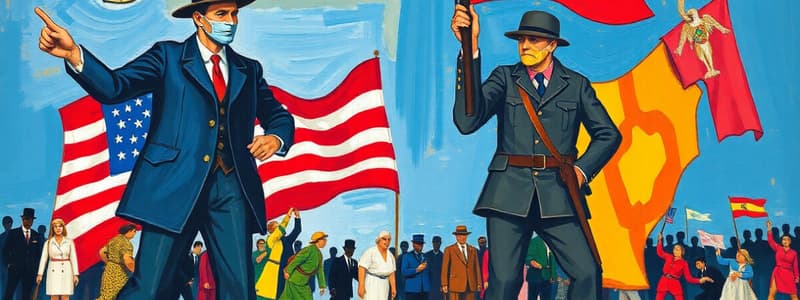Podcast
Questions and Answers
What was one major goal of US Imperialism during the late 19th and early 20th centuries?
What was one major goal of US Imperialism during the late 19th and early 20th centuries?
- To spread Western culture and secure new markets (correct)
- To limit trade with Latin American countries
- To oppose all forms of diplomacy
- To promote isolationism in relation to European nations
What was the consequence of the sinking of the American battleship in Havana Harbor?
What was the consequence of the sinking of the American battleship in Havana Harbor?
- It resulted in a declaration of war against Spain (correct)
- It led to the immediate creation of the Panama Canal
- It sparked a peace agreement between the US and Spain
- It marked the US's transition to isolationism
How does Dollar Diplomacy, as described in the content, operate in foreign relations?
How does Dollar Diplomacy, as described in the content, operate in foreign relations?
- It emphasizes military intervention in foreign nations
- It encourages investment from US businesses in foreign countries (correct)
- It promotes isolationist policies to avoid foreign conflicts
- It seeks to dismantle foreign markets for US vendors
What distinguishes Moral Diplomacy from the other forms of diplomacy mentioned?
What distinguishes Moral Diplomacy from the other forms of diplomacy mentioned?
What is a key function of the Panama Canal as described in the content?
What is a key function of the Panama Canal as described in the content?
Flashcards
US Isolationism
US Isolationism
A policy of non-intervention in other countries' affairs, advocated by President George Washington in his farewell address.
US Imperialism
US Imperialism
The US aimed to expand its influence and power by promoting trade, spreading Western culture, and acquiring new markets.
Spanish-American War
Spanish-American War
A war between the US and Spain sparked by tensions over Cuba's independence and the sinking of the USS Maine in Havana Harbor.
Panama Canal
Panama Canal
Signup and view all the flashcards
Big Stick Diplomacy
Big Stick Diplomacy
Signup and view all the flashcards
Study Notes
George Washington's Farewell Address
- Washington advocated for isolationism in US foreign policy, advising minimal involvement with other nations' political affairs.
Reasons for US Imperialism
- Driven by a desire to expand Western culture, access new markets, and acquire resources.
Spanish-American War
- The US aimed to support the independence of Cuba and Puerto Rico from Spain.
- The sinking of the USS Maine in Havana Harbor triggered a war with Spain.
- The US battleship USS Maine exploded, killing 260 US sailors.
Panama Canal
- The Panama Canal provided crucial trade access connecting the Atlantic and Pacific Oceans, eliminating the need for a lengthy voyage around South America.
- Construction involved significant human cost, with numerous deaths due to disease.
- The US supported Panama's independence movement from Colombia to facilitate canal construction.
- Canal operation involved a multistage process of lock navigation for ships.
US Foreign Policies
-
Big Stick Diplomacy (Roosevelt): A policy of assertive intervention in Latin America to prevent European interference in the Western Hemisphere—preventing non-USA influence.
-
Dollar Diplomacy (Taft): Used US investments in foreign countries to exert influence and gain control.
-
Moral Diplomacy (Wilson): Rejected imperialism and promoted peaceful relationships through upholding international moral principles and opposed intervention.
-
Differences: Roosevelt focused on physically intimidating potential rivals, Taft prioritized economic influence, and Wilson emphasized moral leadership and anti-imperialism.
-
Similarities: Roosevelt and Taft's approaches both involved forms of intervention in other countries for US interests—though with different methods.
Studying That Suits You
Use AI to generate personalized quizzes and flashcards to suit your learning preferences.




